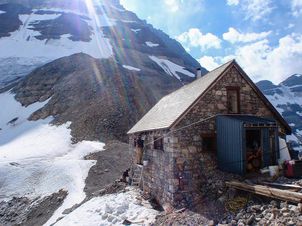
| A humble building known as the Abbot Pass Hut is one of the Western Hemisphere’s most intriguing structures. It was constructed 98 years ago as a shelter for mountaineers attempting to scale either Mount Victoria or Mount Lefroy, two of the higher peaks in Banff Provincial Park in Alberta, Canada. The hut continues to serve as an overnight waystation for hikers and climbers. What makes it famous is its location. It sits in Abbot Pass (9,598 feet above sea level) directly astride North America’s hydrological watershed – the imaginary line popularly known as the Continental Divide. If a raindrop or snowflake falls on the eastern half of the hut’s roof, it will eventually make its way to Hudson Bay and the Atlantic Ocean. Precipitation that falls on the western half of the roof winds up in the Pacific Ocean. To spend a night in the Abbot Pass Hut is to teeter on the mountainous “rooftop” of the Western world. Depending on which direction you turn when you step outside in the morning, you’ll be heading downhill – toward either one or the other of the world’s two greatest bodies of water. Most people who cross the Continental Divide on paved highways hardly notice it – unless they see an information sign informing them they have just surmounted the watershed. Things are a bit different on the pages of Scripture. Just a half dozen chapters into the New Testament, there’s a sudden and dramatic change in how people pray – specifically, in how they picture the God to whom they are directing their heartfelt requests. We might call it the Bible’s Continental Divide. Before Matthew 6, God is addressed formally, even fearfully. On the pages of the Old Testament, God is our Maker, Sustainer, Consuming Fire, Shield, Rock, and Strong Tower. He is the Lord Almighty, high and lifted up. After Matthew 6, however, people begin to address God as “Daddy.” How in the world does this happen? It happens because of the opening words of the Lord’s Prayer. It’s worth noting that prayer is the only activity in the four Gospels for which Jesus’ disciples specifically request training. We never hear them asking, “Lord, teach us how to share our faith, or cast out demons, or run a capital campaign that will really impress the Episcopalians.” The disciples would have been fully trained in the first century Judaic disciplines of prayer. But in Jesus they observe something different going on. So they ask an expert to mentor them – “Lord, teach us how to pray” – just as we might say, “Patrick Mahomes, teach us how to throw touchdowns while scrambling,” or, “Warren Buffett, teach us how to turn a few dollars into millions.” In response, Jesus doesn’t give a lecture. He prays an actual prayer. Most Bible scholars agree that when Jesus says in Matthew 6:9-13, “This, then, is how you should pray,” he’s not locking us into these specific words. It takes approximately 18 seconds to speak the words of the Lord’s Prayer, and I know of at least one Bible teacher who believes Jesus was telling us we should never pray longer than 18 seconds. Assuming instead that Matthew 6 provides a general model for sustaining a conversation with God, let’s take a closer look at the Lord’s Prayer today and over the next few mornings. It begins with two stunning words: Our Father. It would have been entirely appropriate for Jesus to have said, “My Father.” He is, after all, the only true Son of God. We are God’s children by spiritual adoption. But by using the word “our,” Jesus is inviting us into the family conversation. Using the word “Father” is like crossing the boundary into an entirely new way of relating to God. Even though the Messiah is described as “the everlasting Father” in Isaiah’s famous prophecy so often quoted at Christmas (Isaiah 9:6), there’s no evidence that anyone in Israel’s history had ever had the audacity, in private prayer, to address the Lord in such a familiar way. Nobody, that is, until Jesus. But there’s more. Jesus uses the word abba, which is the Aramaic word for “Daddy” or “Poppy.” This is the language of the street, the rhetoric of the nursery – the word a toddler would use when asking for a drink of milk, or when seeking comfort in the middle of a midnight thunderstorm. Children don’t know any better than to say, “Daddy, I need you right now!” That’s how Jesus instructs his disciples to pray. Which is why the Lord’s Prayer is the Bible’s spiritual watershed. Before Jesus, God is someone who just might scare us to death. We cannot fathom his holiness and perfection. Isn’t our own unholiness and imperfection an automatic disqualifier for a conversation with the Divine? After Jesus, however, the door to God’s back porch is open. Against all expectation, we’re being beckoned to cross the threshold and kick off our shoes. It’s a dreadful thing to spend a night wavering between two very different visions of God – to be stuck in a “hut” wondering if God is your enemy or if God is your ally. The next morning when you wake up, which way should you turn? Jesus invites us to step onto the path that he himself followed – to believe that, by his grace, we are the treasured children of a Papa who will never let us go. |
